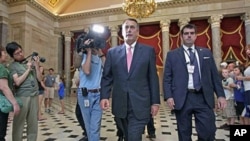In U.S. politics, Washington is in recovery mode after a bruising fight over raising the national debt limit. President Barack Obama signed a compromise measure into law Tuesday that allows the U.S. government to borrow more money to meet its financial obligations in exchange for Republican demands for significant cuts in government spending. Both sides are breathing easier after averting a debt default, but, another battle over the size of the central government is just months away.
The political debate over the debt limit transfixed the capital for weeks and when the dust cleared most political analysts agreed that Republican demands to begin dramatic cuts to government spending had shifted the political center of gravity in Washington.
Republicans believe they are on the upswing after demanding steep cuts as the price for raising the debt ceiling. Many Democrats are discouraged, feeling they gave up too much in the way of cuts, and disappointed that the president did not fight harder in the negotiations.
The debt debate was closely watched by the U.S. public and by many others around the world. What they saw was often a messy demonstration of American democracy in action.
“Well, I think it is embarrassing in terms of our world image," said Rhodes Cook, a Washington-based political analyst with years of experience in covering policy debates. "But it is the way we our government is run these days, particularly over the last 15 or 20 years. There has been, for better or worse, more of this high-stakes gambling attitude between the parties and an inability to get along as well as the members did in the past.”
On the other hand, difficult issues are not easily solved by a Congress that represents the desires of a large, complicated democracy, says former Republican congressman Mickey Edwards of Oklahoma.
“We are a democracy of 300 million people, very diverse, and that is the way important, major decisions have to be made, by fighting it out," said Edwards. "In the end it worked. It didn’t happen overnight but it happened in time and before any kind of a default took place.”
Republicans felt emboldened after last year’s congressional elections in which they won a majority in the House of Representatives and made gains in the Democratic-controlled Senate.
Analyst Rhodes Cook says new conservative members of Congress backed by the Tea Party movement used the debt limit issue to force a debate on the broader question of budget cuts and shrinking the size of the central government.
“I think we are finally, for the first time maybe in a generation or so, really getting into the nub of the basic debate that should be going on in this country over what kind of government do we want," he said.
After signing the debt compromise into law, President Obama quickly pivoted to the issues of creating jobs and growing the U.S. economy, both of which will be at the top of voter concerns heading into next year’s presidential election.
“We’ve got to do everything in our power to grow this economy and put America back to work," said President Obama. "That is what I intend to do and I’m looking forward to working with Congress to make it happen.”
Rhodes Cook says Mr. Obama had a lot at stake politically in the debt debate, mindful that a government default could have wreaked havoc with the U.S. economy and further weakened his re-election hopes next year.
“I don’t know if he strengthened his hand," said Cook. "Let’s put it this way, I don’t think he weakened his hand. I think a [debt) default would have really looked bad for him in particular as the national leader, so that was avoided.”
But former congressman Mickey Edwards says neither side gained a great advantage as a result of the drawn out, polarizing debt limit debate.
“Politically though, it’s amazing," he said. "Neither side won. The poll numbers for both the Republicans and the Democrats, for both the Congress and the president all went down. Everybody lost. This was not a good time politically for anybody involved.”
Republicans are also looking ahead to the 2012 elections and fully intend to hold the president accountable for the state of the domestic economy.
Senate Republican leader Mitch McConnell was a key player in the debt limit compromise eventually approved by Congress.
“Things have actually gotten worse since the president came to office and we need to move in a different direction," said McConnell.
The next fight over government spending will come later this year when a special bipartisan congressional panel will recommend further deficit reductions, which is expected to restart the partisan battle all over again.
Democrats are already insisting that tax increases be part of that panel’s discussion, a view that Republicans say they will fiercely resist.
Experts Assess Winners And Losers in US Debt Debate
- By Jim Malone





